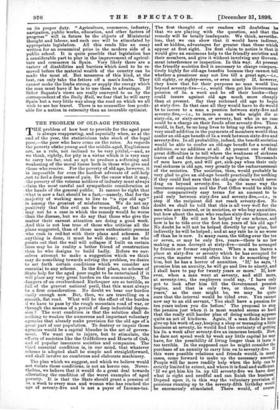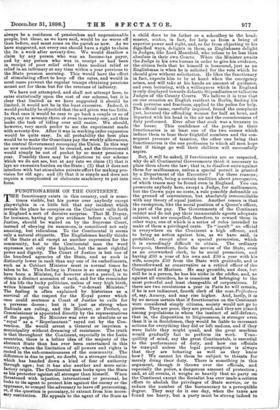THE PROBLEM OF OLD-AGE PENSIONS.
THEproblem of how best to provide for the aged poor is always reappearing, and especially when, as at the end of the year, the statisticians take stock of the legal poor,—the poor who have come on the rates. As regards the poverty ofathe young and the middle-aged, Englishmen are, as a rule, not inclined to be very pitiful,—and, as we think, rightly, for pity is a virtue which it is very easy to carry too far, and so apt to produce a softening and weakening of the moral tissue both in those who give and those who receive. For the poverty of old age, however, it as impossible for even the hardest advocate of self-help ‘..not to feel a deep sense of pain. Be the cause what it may, the poverty of the veteran soldiers of industry must always „plaice the most careful and sympathetic consideration at . the hands of the general public. It cannot be right that what is now a fact should be a fact,—namely, that for the „majority of working men to live to "a ripe old age" is among the greatest of misfortunes. We do not say , positively that this evil can be remedied, or that this . may not be a case in which the remedy would be worse than the disease, but we do say that those who give the matter their earnest attention are doing a good work. And this is not less true of those who criticise all the .plans suggested, than of those more enthusiastic persons . who rush in red-hot with their plans and schemes. If anything is done, it must be well done; and he who points out that the wall will collapse if built on certain lines may be in reality a better friend of construction - .thaa he who designs to build badly. Before we our- ..selves attempt to make a suggestion which we think may do something towards solving the problem, we desire to set forth certain conditions which we consider are essential to any scheme. In the first place, no scheme of State help for the aged poor ought to be entertained if it will place any very great burden on the community. The dangers of an overburdened Exchequer are so terrible, so full of the gravest national peril, that this must always be a first consideration. No doubt we bear our burden • easily enough now. But, then, we are travelling on a sruooth, flat road. What will be the effect of the burden if we have to pass by the rough mountain road of war, or through the morass of a period of deep industrial depres- sion? The next condition is that the solution shall do nothing to weaken the numerous and important voluntary agencies that already make provision for the old age of a great part of our population. To destroy or impair those • agencies would be a capital blunder in the art of govern- ment. We want not to injure, but to stimulate, the efforts of societies like the Oddfellows and Hearts of Oak, a.ad of popular insurance societies and companies. The third essential condition is, in our mind, that whatever scheme is adopted shall be simple and straightforward, and shall involve no cumbrous and elaborate machinery.
The plan which we suggest, and which we believe would not violate these conditions, is not an heroic one. Never- theless, we believe that it would do a great deal towards alleviating the condition of the worst examples of aged poverty. It is that the State should grant a pension of 5s. a week to every man and woman who has reached the -age of seventy-five and is not a payer of Income-tax. The first thought of our readers will doubtless he that we are playing with the question, and that the remedy will be totally inadequate. We think, neverthe- less, that we can show that it would have indirect, and so hidden, advantages far greater than those which appear at first sight. Its first claim to notice is that it would give an enormous help to the friendly societies and their members, and give it without involving any Govern- ment interference or inspection. In this way. At present the friendly societies find it necessary to charge compara- tively highly for old-age benefits because they cannot tell whether a pensioner may not live till a great age,--i.e., till eighty, or eighty-seven, or even ninety. If, however, they knew tkat for their purposes no man would live beyond seventy-five—i.e., would then get his Government pension of 5s. a week and be off their books—they could insure against old age much more cheaply than at present. Say they reckoned old age to begin at sixty-five. In that case all they would have to do would be to insure to a man a pension between sixty-five and seventy.five,—i.e., to insure a man who might die at sixty-six, or sixty-seven, or seventy, but who in no case could be a charge on their funds after seventy-five. There would, in fact, be no long lives to bring up the average. A very small addition in the payments of members would thus confer an old-age benefit of .5s. a week between sixty-five and seventy-five. In all probability, indeed, the benefit societies would be able to confer an old-age benefit for a nominal addition, or no addition at all. At present one of their great difficulties is to tell where the weakness of sickness leaves off and the decrepitude of age begins. Thousands of men have got, and will get, sick-pay when their only real sickness is old age, very greatly to the embarrassment of the societies. The societies, then, would probably be very glad to give an old-age benefit practically for nothing if they could feel sure that the old-age claim would never drag on beyond seventy-five. In the same way the insurance companies and the Post Office would be able to offer comparatively easy terms for an amount to be paid only between sixty-five and seventy-five,—i.e., to stop if the recipient did not reach seventy-five. No doubt we shall be told that this is all very well for the men who are insured, or in societies, or who buy annuities, but how about the man who reaches sixty-five without any provision ? He will not be helped by our scheme, and how is he to tide over the first ten years of his old age ? No doubt he will not be helped directly by our plan, but indirectly he will be helped ; and at any rate he is no worse off than he is now. In many cases, the tiding over the ten or seven, or may be only five, years—there is no law making a man decrepit at sixty-five—could be arranged by friends or former employers. When a man leaves a place at sixty-five or seventy which he has occupied for years, the master would often like to do something for him, but he has a horror of annuities. 'If,' he says, 'I promise him an annuity, he will go and live to ninety, and I shall have to pay for twenty years or more.' If, how- ever, when a man went at seventy, and still more, at seventy-two, the employers could say, 'I have only got to look after him till the Government pension begins, and that is only two, or three, or four years,' as the case might be, we may be quite sure that the interval would be tided over. You cannot now say to an old servant, You shall have a pension for ten years unless you die before.' The proposal to stop the pension just when it is most wanted seems so hard that the really still harder plan of doing nothing appears quite an act of kindness. Again, if a, man finds he must give up his work of, say,keeping a shop or managing a little business at seventy, he would find the certainty of getting his 5s. a week after seventy-five an immense benefit. Now, he dare not spend week by week any little capital he may have, for the possibility of living longer than it lasts is too terrible. In the supposed case he might consider the purchase of an annuity to carry him on to seventy-five. If this were possible relations and friends would, in many cases, come forward to make up the necessary amount, People will far more readily help when the help can be strictly limited in extent, and where it is final and sufficient If we get him his 5s. up till seventy-five we have done, what is right and needful and can finish the business. Depend upon it, in this way the .voluntary provision of pensions running up to the seventy-fifth birthday would be enormously stimulated. There would, of course, always be a residuum of pensionless and unpensionable people, but these, as we have said, would be no worse off than before, and must come on the parish as now. As we have suggested, not every one should have a right to claim the 5s. a week after seventy-five. We would disallow a claim by any person who was an Income-tax payer, and by any person who was in receipt or had been in receipt of poor relief other than medical relief or relief in an infirmary at any time within a year previous to the State pension accruing. This would have the effect of stimulating effort to keep off the rates, and would in most cases prevent the regular tramps obtaining pensions meant not for them but for the veterans of industry.
We have not attempted, and shall not attempt here, to enter statistically upon the cost of our scheme, but it is clear that limited as we have suggested it should be limited, it would not be in the least excessive. Indeed, it would probably be objected that the aid given was too little. In that case it would be easy to go back a couple or so of years, say to seventy-three or even to seventy-one, and thus make the task of tiding over still easier. We should, however, very much prefer to see the experiment made with seventy-five. After it was in working order expansion would be quite easy. In all probability the best plan would be to make the Guardians pay the weekly allowances, the central Government recouping the Union. In this way no new machinery would be created, and the Government would simply be out of pocket by so many pensions a year. Possibly there may be objections to our scheme which we do not see, but at any rate we claim (1) that it lays no excessive burden on the State ; (2) that it does not interfere with but stimulates private effort for making pro- vision for old age ; and (3) that it is simple and does not require a complicated or elaborate machinery to put into force.



































 Previous page
Previous page